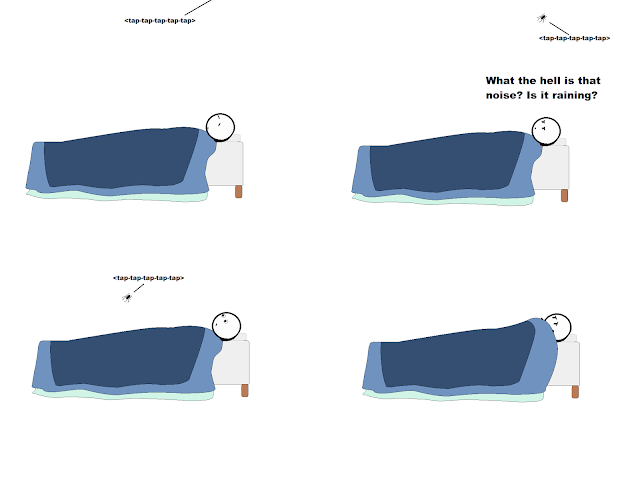More bugs, this time ones that crawl on the ground.
Bug
How have I not done this before? Anyway, bug showed up in
the
early seventeenth century, first
referring to bedbugs before it was insects in general. Its origins are kind of
murky, but it might be related to the
Middle English bugge, which
is something frightening or a scarecrow in particular. It could also be related
to the Scottish
bogill, a goblin or bugbear (the latter of which
actually has the original, something frightening definition of bug). As for all
the other definitions of bug that arose over the years, like a machine defect
(from 1889), to annoy someone (not until 1949!), and to secretly record (1946).
There’s also bug-eyed, like someone with large eyes, and you’d think that would
be related to insects, but it’s not. It’s thought to be from bulge instead!
Maggot
Maggot, the larva stage of flies,
is supposed to be a
corruption of the word
magat, which is also thought to be from the
Middle English
maddok, which could mean a maggot but also a worm—so
things that squirm. That’s from the
Old English maþa, which is
pronounced “matha” and means maggot or worm. It’s from the
Proto Germanic mathon, and
that’s as far back as we can trace. So it hasn’t changed much except for the th
inexplicably turning into gg.
Worm
Speaking of worm, it
comes from the Old English
wurm/
wyrm, which meant a
legless reptile like a snake. It comes from the Proto Germanic
wurmiz, from the
Proto Indo European wrmi-, which means worm, which is
from
wer-,
to turn or bend. And
man, the shear number of words that’s related to! We’ll have to get into it
sometime.
Caterpillar
Another larva, this word showed up in the
mid fifteenth century as
catyrpel, and
the Y makes it look soo much cooler. It’s from the
Old North French caterpilose, which literally means “shaggy
cat”, from the Late Latin
catta pilosa, where catta is
cat and the rest is from
pilosus, hairy or shaggy. A caterpillar is…
a hairy cat?!
Earwig
Now this one is really interesting since it can’t just be
ear + wig… can it? It
comes from the Old English
earwicga, just earwig.
The first part is from
eare, which is just
ear,
while
wicga was just another word for earwig or beetle. It’s origin is unknown, but it’s thought to be from
wiggle,
which does make more sense than wig. I mean, they do wiggle a lot. Though hopefully not in your ear.
Sources
Online
Etymology Dictionary
University of Texas at Austin Linguistic Research Center
University of Texas at San Antonio’s page on Proto Indo European language
University of Texas at Arlington
Tony Jebson’s page on the Origins of Old English
Old
English-English Dictionary







